LOUISVILLE, Ky. -- We form attachments writing about racehorses, as much as some
of us try to deny it. Admiration of the Thoroughbred is, after all, part of why
turf writers do what we do. The best and worst parts of our job revolve around the
campaigns of these runners and our coverage of them. We get to know the horses
and the people who care for them, and some demand our respect, and some are
just nice to be around.
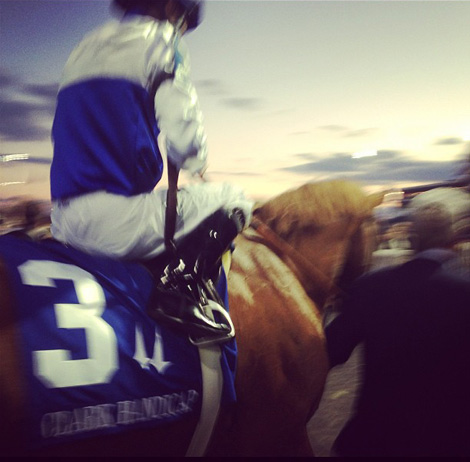
Shackleford, Churchill winner's circle, Clark Handicap 2012 (C. Novak)
The story of Shackleford, the blaze-faced chestnut with a
2011 Preakness win and a legion of fans, came to a close Friday evening with a
frontrunning score in the Clark Handicap (gr. I) at Churchill Downs. His third
grade I victory in a three-year span for co-owners and breeders Mike Lauffer and Bill Cubbedge was one of his most important, as he will
now be retired to stud at John Phillips’ Darby Dan Farm near Lexington.
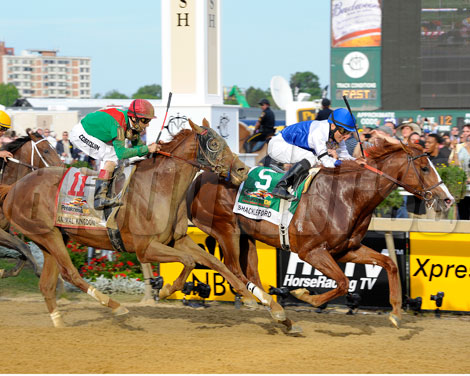
Shackleford wins the 2011 Preakness (A. Eberhardt)
Shackleford wasn’t the superstar every start; he won some
and lost some, as a 6-5-1 record from 20 outings attests. But the son of Forestry danced almost
every dance from the Fountain of Youth (gr. II) in his stakes debut to the
Clark, with starts in the Kentucky Derby (gr. I), Belmont (gr. I), Haskell (gr.
I), Travers (gr. I), Indiana Derby (gr. II), 2011 Breeders’ Cup Dirt Mile (g. I),
Donn Handicap (gr. I), Carter Handicap (gr. I), Churchill Downs Stakes (gr.
II), Metropolitan Handicap (gr. I), Alfred G. Vanderbilt Handicap (gr. I),
Kelso Handicap (gr. II), and the 2012 Breeders’ Cup Dirt Mile (gr. I) among them. In the modern era, staying sound and competitive through that many top-level graded stakes is a feat in and of itself. Shackleford did.
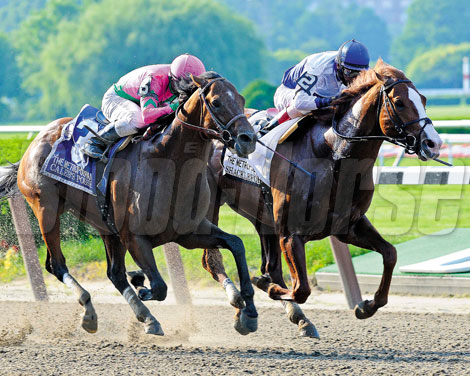
Shackleford beats Caleb's Posse in the 2012 Met Mile (Coglianese Photo)
Maybe it’s not that we form attachments to horses as much as
we get used to having them around. We watch them train and write about their
breezes and their travels and their racing plans. We preview their starts and
recap their finishes. We learn their habits and foibles, strengths and weaknesses.
Maybe it’s not so much an attachment as it is a comfort level, like getting to
know someone who was once a stranger and is now a good friend.
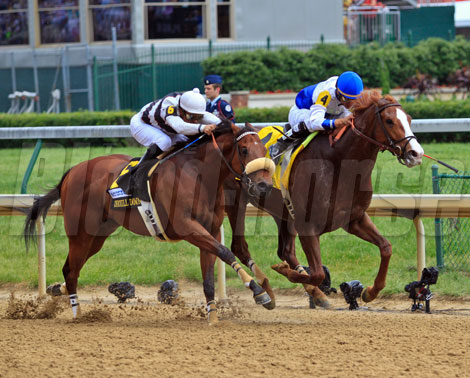
Shackleford wins the 2012 Churchill Downs Stakes (K. Thompson)
I first laid eyes on “Shack,” as trainer Dale Romans and the
rest of his connections and fans tend to call him, in the paddock at Churchill
Downs before the Derby (he ran fourth after showing the way with quick early
fractions). The big colt was schooling in preparation for the race, and his
burnished coat was gleaming and his neck was arched as he pranced with high
suspension around the walking ring. He exuded energy, confidence, and pure
class. Watching him, you couldn’t help feeling it. Watching him, you thought Ah, now THERE’S a racehorse!
I remember interviewing Graham Motion when Animal Kingdom
was beaten by Shackleford at the Preakness. I remember interviewing Jesus
Castanon when Shackleford was training for the Travers. I remember interviewing
Dale Romans on several occasions, and several topics centered around the runner
who took his career to another level... and I remember Shackleford... poking his handsome
head out of a stall at Churchill, Pimlico, Santa Anita… rolling in the sand pit
outside a Saratoga barn... bouncing along like a helium balloon on the end of a
lead shank in photos snapped by racing paparazzi.
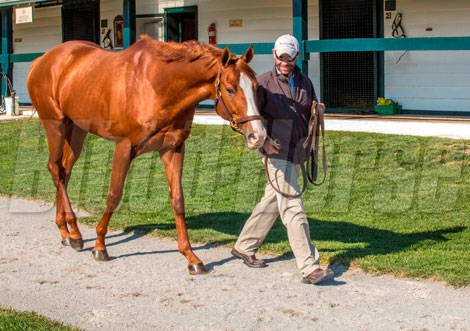
Shackleford walks at Darby Dan Farm with Ryan Watson (K. Thompson)
Shackleford left Churchill today, retiring with more than $3 million in earnings and headed for a new phase of life. But earlier in the month we had a chance to visit
when Romans popped him on a van, shipped him down to Darby Dan, and made him available
to previewers. As in his racing career, he took the transition in stride,
standing and walking with professional composure while taking in his
surroundings with a curious eye.
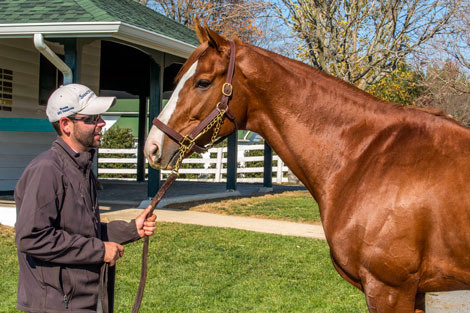
Shackleford and stallion manager Ryan Watson at Darby Dan (K. Thompson)
Racehorse retirements are often emotional affairs, the exact
circumstances of which are rarely dictated by the powers that be. Horses get
hurt, get sick, leave the sport too soon, disappoint us. Much can be said,
then, for Shackleford’s story. He was steady, he was sound, and at the top of
his game, he put on a show – as he did last Friday, when he closed out his
career with the perfect ending.




